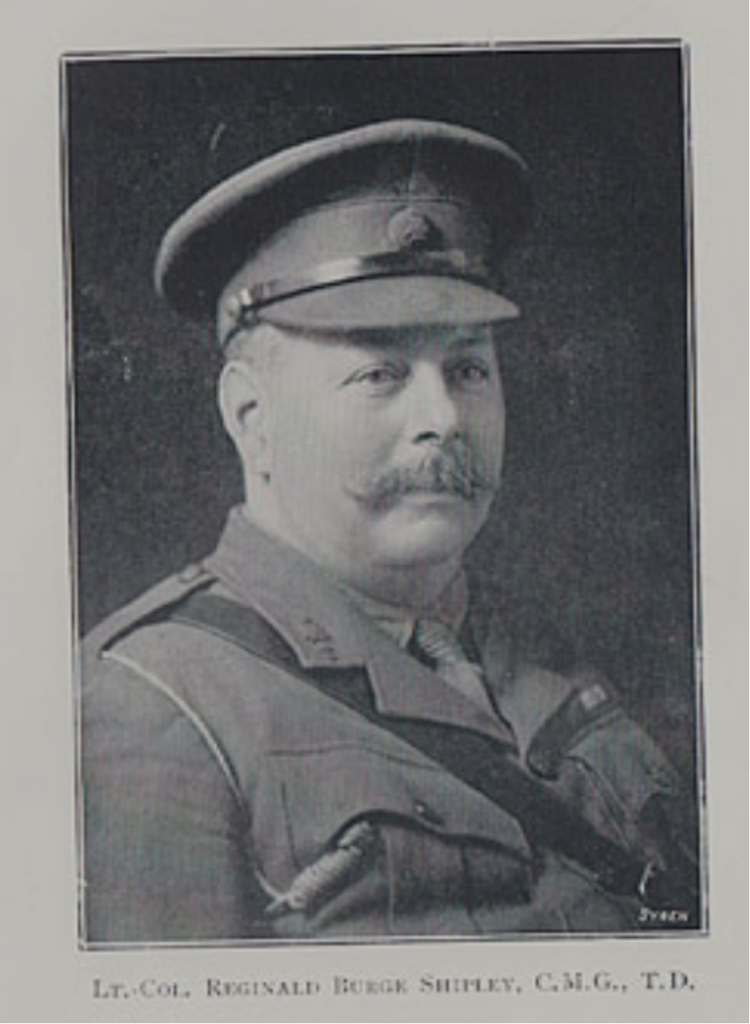
Colonel Reginald Burge Shipley CMG joined the Lodge in October 1897, having been initiated in the Cadogan Lodge No 162, being installed as Master in 1901. He was exalted into Cadogan Chapter. Cadogan Lodge was closely connected with and restored to health by this lodge’s consecrating officer Stephen B Wilson JGD.
He was born in 1867 the youngest child of Alexander Shipley and Amelia Burge of the Hall, Datchet. One of his brothers was Sir Arthur Shipley MRS the Master of Christ’s, and he worked in partnership with a second brothers, Sir Alexander William Shipley in the firm of Burge & Co, the Windsor brewers. He also had three sisters: Amelia Emily, Eveline Denezy and Lilian Mabel Shipley.
He went to Haileybury before being gazetted into the 6th Middlesex (St George’s Rifles) RVC in February 1888. He was promoted Lieutenant on the merger of his Regiment with Queen Victoria’s Rifles forming the 1st Middlesex RVC.
He was the Regimental Musketry instructor before being promoted Captain in 1897. He served with the City Imperial Volunteers in South Africa in 1900, commanding E Company which included the 39 NCOs and men of the Regiment wh volunteered for active service in South Africa. His first duty however was command of the 250 officers and men who embarked for South Africa on the Garth Castle. Not only did he command on board, but the need to entertain bought out his musical talents. On a guest night for the officers and ships crew he sang “Jack’s the Boy” and “Midshipmite” to the general approval of all assembled and they even demanded an encore that he was only saved from by the ‘lights out’ bell according to 447 Rifleman A E Waller, an Old Hurst Johnian volunteer with the Regiment (but not a member of the Lodge).
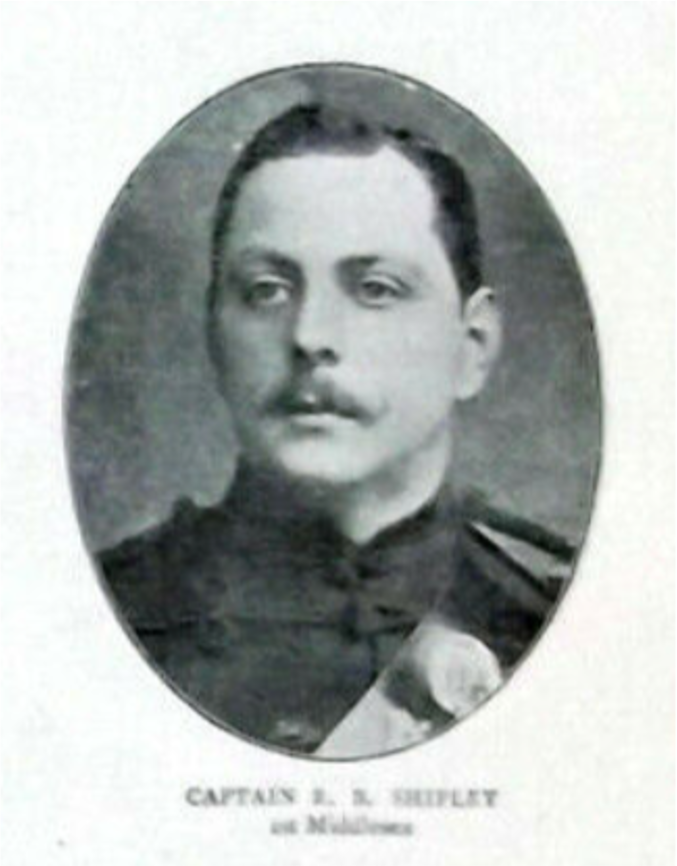
He and the contingent, mounted the Guard at Government House, were inspected by Lord Roberts himself, saw service in the Orange Free State and in actions near Johannesburg and Diamond Hill. The campaign was not without its frustrations. Shipley himself described himself as “a species of Railway Station Master and Cattle Driver” on account of the long hours the CIV spent on logistical duties guard and defending and maintaining and managing the railways upon arrival in South Africa.
Shipley was described by Waller as “getting on very well and is good to the Company”, high praise coming after the period of active service that followed railway duties. Not that he was a soft touch. 758 miles of marching and 12 months of active service would see the same writer comment on Capt Shipley’s wrath and temper, albeit in the context of everyone’s exhaustion and being “from Lord Roberts downwards… heartily sick of the campaign”.1
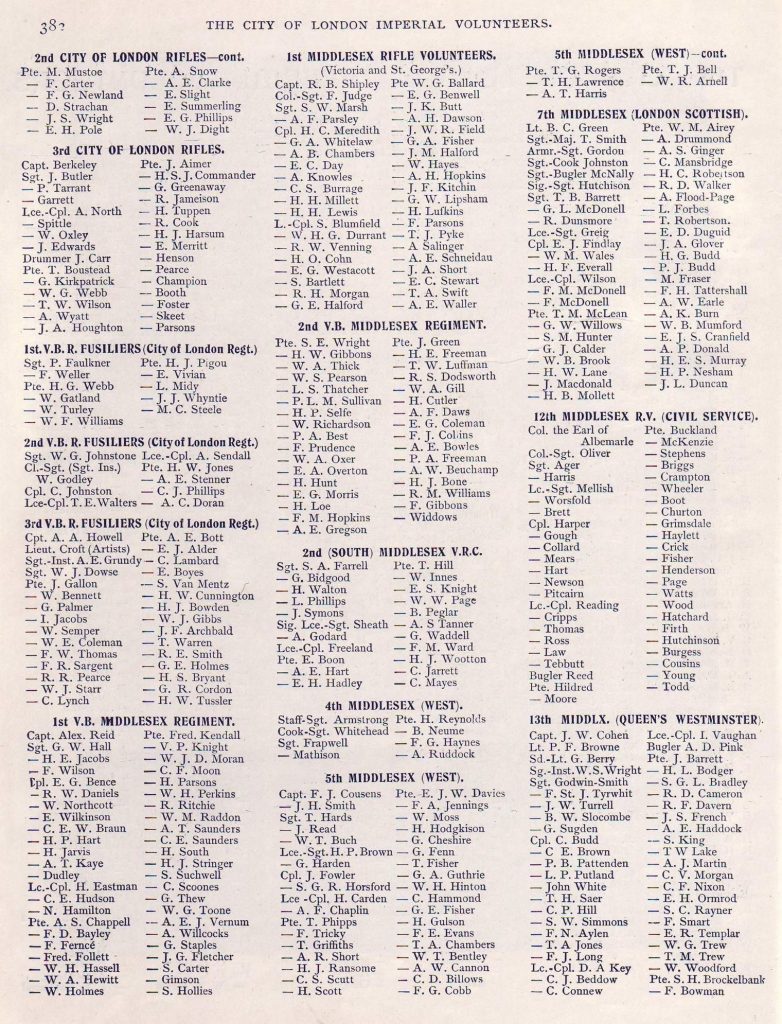
His duties extended to being Mess President for an ”At home ” for Lord & Lady Roberts. The Regimental History recalls
“Our bleak kopje was much enlivened by the two or three carriages, the staff, and the escort. Shipley, mess president, gave us a capital tea, in which Sergeant Dunbar assisted him, and it was a great success. All our mounted infantry and battery officers came, and the men cheered vociferously as Our Colonel rode away.”
Returning he served in the progressive Lodge offices before being made Worshipful Master in January 1905.
He took command of the Regiment from December 1912 with Dickins, his later successor in command, as his second-in-command.
The Battalion formed part of 3rd London Brigade, 1st London Division. With the war clouds looming, as part of their commitment as members of a Territorial Force battalion, the officers and other ranks of the battalion were on a train journey to Lulworth, Dorset for annual camp on 2 August 1914, but on reaching Wimborne, Dorset, the train was turned back to London, it being the day after Germany had declared war on Russia, and the day before declaring war on France.
On 24 August 1914 the Battalion went to Bullswater Common Camp near Pirbright, Surrey, where each soldier in the battalion was asked individually by their company commanders, if they would be willing to volunteer for foreign service, all having committed themselves for service within the United Kingdom when they had initially joined the Territorial Force. More training was carried out at Crowborough, Sussex where much of which was in the form of battle training in preparation for going to the Western Front. The Regiment sailed to France onboard the SS Oxonian on 4 November 1914.
The Regiment bolstered its reputation in trying conditions. Conan Doyle, famous for his writing on more fictional topics wrote in his “British Campaign in France and Flanders” that:
“The Queen Victorias under Colonel Shipley upheld the rising reputation of the Territorial troops by their admirable steadiness.”
Shipley handed over command to Dickins in May 1915 when he was invalided home and received the CMG in June. He was also Mentioned. After a partial recovery he spent some time on the Staff, but his injuries were not sufficiently recovered for full time duties.
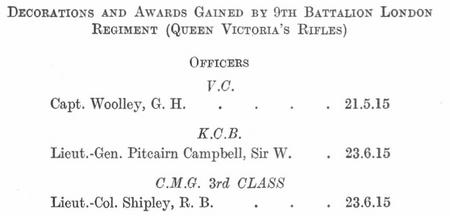
He married Flora Marion, daughter of William Wallace of Oklahoma, and they had a son, Alan Reginald Wallace Shipley, who joined the Lodge and the Regiment and then took a regular commission with the DCLI and served through the Second World War.
Shipley died in March 1924 after 12 months of serious illness. His obituary was reported in the Times.

After his passing Col Dickins, ever present by his side in Lodge and the Battalion became Chairman of the Brewery business until its sale to Meux. Shipley clearly valued the support of his Masonic and Regimental brethren, as E W Kingdon was also a debenture holder in the brewery business.
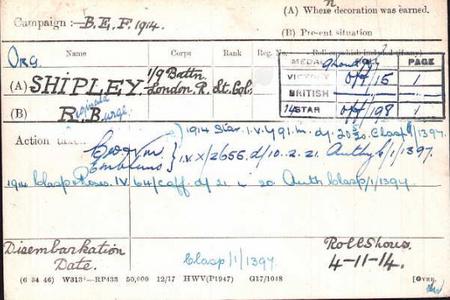
Sources:
1. WITH THE C.I.V. IN SOUTH AFRICA: Letters of No. 447 Private A. E. Waller by Michael Barthorp. Journal of the Society for Army Historical ResearchVol. 66, No. 268.